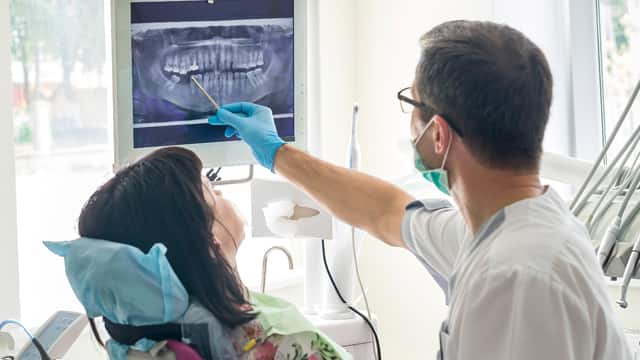What Is A Dental Emergency?
A dental checkup consists of routine cleaning, X-rays, and consultation every six months. A dental emergency is anything but routine. With dental emergencies, usually obvious and immediate action is necessary to address severe pain, discomfort, or trauma to the mouth that may cause bleeding and lacerations to the gums and dislodge or fracture teeth. Some instances, like lost fillings, chipped veneers, or broken dental appliances, while extremely inconvenient — don’t constitute an emergency.
What Are Some Dental Emergency Symptoms and Quick Treatments?
Below is a list of common dental emergencies and what you should do, including when to contact your dentist.
Cracked or Broken Tooth
If your tooth is broken:
- Use warm water to rinse out your mouth
- Apply a cold compress for swelling
Knocked-Out Teeth
If you have a knocked-out tooth:
- Don’t touch the root, only the crown
- Try to place it back in the socket, if possible
- Or place it between your cheek and gum or a container of milk
- Use a cold, wet compress for bleeding
Tooth, Teeth, or Jaw Pain
Your pain could be associated with:
- Swelling, fever, a sour taste, or difficulty swallowing indicating an infection
- An abscessed tooth with pain coming from your tooth’s pulp canal that could require antibiotics, drainage, or root canal
Bleeding or Aching Gums
Excessive and frequent bleeding along with aching gums is an indicator of periodontal disease that requires:
- Treatment to keep gums, teeth, tissue, and bones healthy
- Treatment will vary based on the severity
Soft Tissue Injury
If you have severe bites or cuts to your lip or tongue:
- Clean the area gently with water
- Apply a cold compress for bleeding
- See a medical professional for severe bites or cuts that require stitches
What To Do If You Need Emergency Dental Care
If you are experiencing some of the dental emergency symptoms listed above, contact your dentist’s office immediately. If you get their voicemail, they’ll likely provide an emergency phone number or instructions. Leave a message and explain your symptoms in detail. Usually, emergencies get treated as quickly as possible. If pain and discomfort persist and you need to see a medical professional, visit your closest emergency room so they can treat your pain and discomfort, and determine if a dental visit is necessary.
Hopefully, you never have to experience a dental emergency. But if properly informed and prepared — you should recover quickly and emerge healthily.
Oral Care Center articles are reviewed by an oral health medical professional. This information is for educational purposes only. This content is not intended to be a substitute for professional medical advice, diagnosis or treatment. Always seek the advice of your dentist, physician or other qualified healthcare provider.
ORAL HEALTH QUIZ
What's behind your smile?
Take our Oral Health assessment to get the most from your oral care routine
ORAL HEALTH QUIZ
What's behind your smile?
Take our Oral Health assessment to get the most from your oral care routine






.png)








